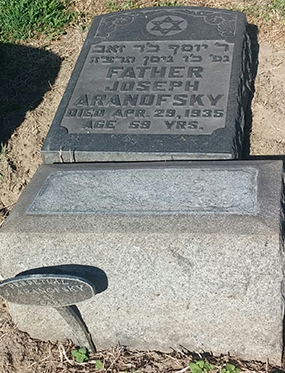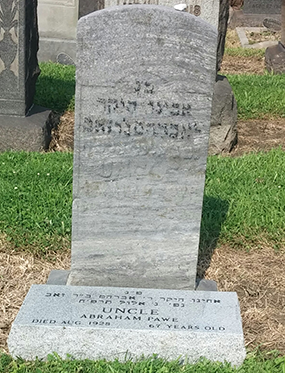Lessons of Caring
One Woman’s Lifelong Commitment to Cemetery Preservation

Janet Ghiandoni eagerly awaits the day when her grandfather's headstone will be erected.

Janet fulfills her late mother's wish of putting a new stone on her uncle Pawe's grave.
As a little girl, Janet and her grandmother took street car rides to the Lansing Cemetery in Cleveland where they cleaned the graves and maintained the surroundings, ensuring the dignity of the departed. Janet Ghiandoni grew up in Cleveland Heights and visited Lansing with her grandmother several times a year. She distinctly remembers visiting the graves of many relatives she hardly knew anything about.
“It was more than a custom in those days,“ Janet said. “It was considered an embarrassment to the family if the graves were not pristine. There was a greater sense of community then.” As a little girl, the activity didn’t mean much to Janet, but it meant a lot to her grandmother, and to her that was important.
As Janet grew older, her visits to the cemetery became less frequent. “We went on holidays, for funerals, and that’s pretty much it,” Janet said with a hint of regret. The headstones eventually became illegible. “When my mother visited, she couldn’t read what was written on Uncle Pawe’s and her aunt’s stones. So she promised to replace them during her lifetime.” She only got to one.
Replacing Uncle Pawe’s stone became Janet’s responsibility. As a young adult, she did not feel the same commitment that her mother or grandmother felt. “People had moved away, families had died out, we became less connected,” she said. But then something changed in her. A moment changed her.
Janet started working on her family tree and visited the Lansing Cemetery where her grandfather was buried. “My grandfather’s stone had fallen,” she remembered. “I was upset. I felt my mother tell me, ‘You have to do something about this, Janet.’”
That is when she met the local rabbi. He told her a story about the time he was walking the cemetery grounds and a man with a bulldog walked along the other side, who called out to him. A fence divided them, and divided the cemeteries. Where the Rabbi walked was overgrown with weeds and toppled headstones, and where the man walked was a well-maintained city-owned cemetery .The man asked, “Aren’t you ashamed?” The Rabbi looked over the fence at the man and said, “Yes, I am.”
At that moment Janet knew things had to change. But what she didn’t know was that the work she was about to do, and the determination she would do it with, would one day make this project, cemetery preservation, a passion.
After becoming involved with the Lansing Cemetery, her first step was to connect with the Jewish Federation of Cleveland. The Federation, along with its supporting foundation, Commission on Cemetery Preservation (COCP), established in 1993, provided funding for maintenance of Jewish cemeteries that had fallen into disrepair. Through its efforts, they had taken over the upkeep of several cemeteries in the area, and Janet wanted to know what else could be done. She approached Federation President, Steve Hoffman, with her concern and he immediately responded, “Janet, I will not retire unless the cemeteries are in good shape,” she happily remembered.
And, so it began. The Federation’s Jewish Volunteer Network (JVN) took an immediate interest and gathered hundreds of volunteers who helped beautify the grounds at the 124-year-old Lansing Cemetery. “It’s a mitzvah,” said young Maddie during one of the cleanups. Today, Maddie comes with her grandfather at every opportunity, just as Janet came with her grandmother. These lessons of caring for those who have come before us, these Jewish values, they are being passed down through activities like cemetery cleanups. And, over time, more and more people have become interested in helping preserve Cleveland’s Jewish history through cemetery preservation.
The Federation has recently launched a Cemetery Preservation Campaign with the goal of raising $3.5 million to honor the deceased. Funds raised by the Cemetery Preservation Campaign will enable the care of cemeteries under the COCP’s jurisdiction — like Lansing — in perpetuity and allow for the addition of other cemeteries as needed. They are currently involved in the maintenance of six Jewish cemeteries, with over 10,000 graves.
With Janet’s help, the improvement process at Lansing has begun with tree removal, stone resetting, and landscaping. “I have many people to thank for this, especially Barry Garvin, who has been a great resource, but my work is not over yet,” she said. Janet hopes to continue educating the community about maintaining the graves of their loved ones and taking responsibility for our Jewish cemeteries. She talked about the importance of not just relying on perpetual care — which most may not know about or fully understand.
According to the blog, “Gravewords: Thoughts of a Gravetender,” “A lot of people tell me that they have perpetual care and I always explain that perpetual care isn’t what they think it is.”
So what is it exactly? “Simply put, perpetual care funds are used for general maintenance and repair of cemetery grounds. For example, mowing and lawn care during the growing season would fall under perpetual care, as would upkeep of roads, paths and signage. Some cemeteries may use funds to repair fallen headstones or raise sunken grave markers but this is not common practice. The family is responsible for the headstone and for keeping the gravesite clean and neat,” said Gravewords.
Janet echoes this. “It’s not enough to pay perpetual care,” she said. “Before 1964, nobody paid perpetual care; families were responsible for the upkeep of the cemeteries. Then perpetual care came into the picture and people started paying around $50 (today it’s around $500-$750) and they thought this would take care of everything: the plot, the headstone, and the foundation. What it really meant was the grounds would be taken care of.” What is left today is what we see before us — because families lost touch with their community, there was no one left to care for their loved ones’ graves. If Janet has one thing she wants people to know it is this: “It takes people to maintain cemeteries.”
And it’s people like Janet who make our Cleveland Jewish community a special place to call home. After years of involvement with cemetery preservation, today Janet has fulfilled her mother’s dying wish of putting a new stone at Uncle Pawe’s grave. Looking to the future, she eagerly awaits the day when the stone at her grandfather’s grave will be erected. And most importantly, she believes that thanks to the Federation, our community’s history will be preserved in our Jewish cemeteries for generations to come.

![[image]](http://access.jewishcleveland.org/images/ad_cemetery_db.jpg)
![[image]](http://access.jewishcleveland.org/images/ad_new_to_cle.jpg)